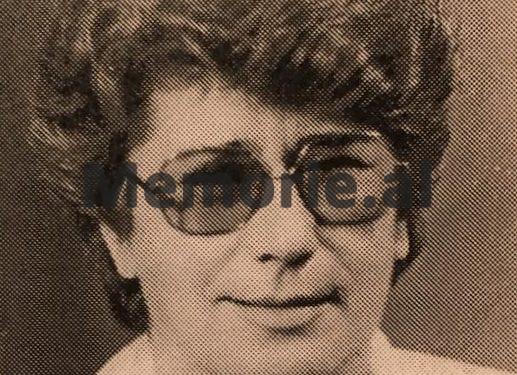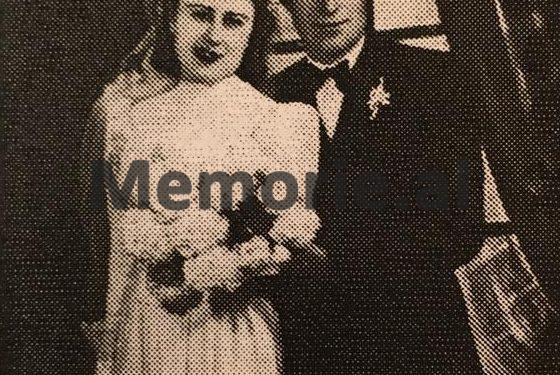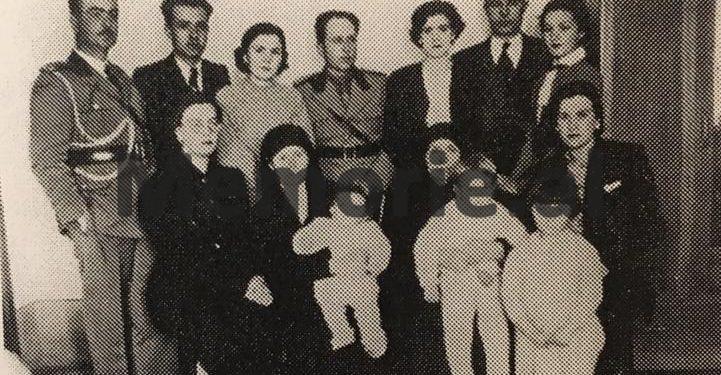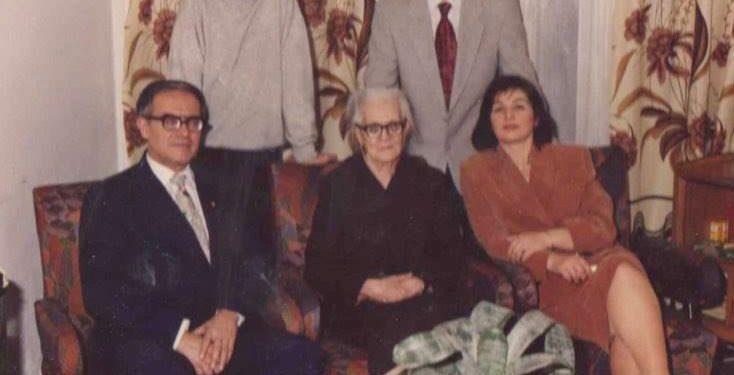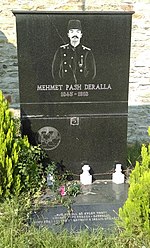Dashnor Kaloçi
Memorie.al publishes the unknown story of the famous Derralla family, originally from Gradec, Polog, Tetovo, where their first, Hasan Pasha, served as Commander of the Gendarmerie of the Sandzak of Prizren, and his son, Mehmeti , was appointed to the position of Commander of the Armed Forces of the League of Prizren, for the city of Tetovo. Rare testimonies of Valdet Derralla, about the history of their tribe from the most famous Albanians of Macedonia and Kosovo, where her grandfather, Mehmet Pasha Derralla, on November 28, 1912, donated to Ismail Qemali, a box of gold for the government where he was appointed Minister of War, while his sons, after being interned in Nazi camps, during the communist regime of Enver Hoxha, were persecuted as a reactionary family and Valdet’s father, after suffering ten years in prison, lived in the basements of the city. of Shkodra, to make a living, made clogs with firewood that the villagers brought to sell.
“Although my grandfather Mehmet Pasha Derralla held the post of Minister of War in the government of Ismail Qemali, and gave him a box of gold for the cabinet, his son and at the same time my father, Hysen Derralla, was imprisoned by the regime for years of Enver Hoxha. “And to make a living, he secretly climbed in the basements of Shkodra, which he then sold in the alleys of that city.” Witnesses exclusively for Memorie.al, Valdete Derralla, who tells the painful story of her family and her father, who after being released from Nazi prisons, was also convicted by the Yugoslav and Albanian communists.
What is the origin of the Derralla family and who were some of the men of that great family of pashas, who were educated in the military academies of Turkey and Italy? What was the fate of the Derralla family and the sons of Mehmet Pasha during the years of the Zog Monarchy and the period of the communist regime of Enver Hoxha?
In Military Academies
Regarding the history of the Derralla family and the sons of Mehmet Pasha, his granddaughter, Valdete Derralla testifies: “After the death of Mehmet Pasha in 1918, the first of that family remained his eldest son Halimi, who was born in in 1878 in Tetovo. He graduated in Law in Istanbul and at that time was elected as a member of the Tetovo Parliament in the Serbian Parliament. In the big house of Derrallave in Tetovo, lived only the boys with their families, after the five married girls, Mehmeti had sent them to the Turkish Stock Exchange since 1912, when he left for Vlora. Also in 1921, the great uncle Halimi came to Tirana and after being called by Ahmet Zogu, proposed to him to become a deputy in the Albanian Parliament. Halimi accepted as a deputy and senator from 1921 to 1929. He died in 1932 in Tirana, where he was given a magnificent burial. After his death, his brothers and family returned to Tetovo. Mehmet Pasha’s second son was Mynyri, who did not live long and died very young. The third son was Gajuri, who was born in Baghdad in 1908, and later he graduated from the Military Academy in Italy. After his studies, he returned to Albania and served for some time as an officer of the Royal Gendarmerie, and then in the Royal Court in Tirana. In 1939, Gajuri went to Tetovo where he served as an officer in the Gendarmerie of that city. The fourth of the boys was, Hyseni, my father, who was born in Tetovo in 1912. My father was 6 months old when Mehmeti left for Vlora for the Declaration of Independence. After graduating from primary and secondary trade school in Tetovo, Hyseni completed his compulsory military service in Sarajevo and in 1931; he came to Tirana, where he continued his high school education in the dormitory “Naim Frashëri”. “After finishing school in 1934, he started working in the Ministry of Economy, where he stayed until 1940”, remembers Valdete Dërralla, regarding her uncles and her father.
Enter Gajur in Nazi prisons!
Regarding the story of her father Hyseni, during the period of Nazi-fascist occupation, Valdeti recalls: “In 1940, my father Hyseni, together with his brother Gajur, dressed as officers of the Albanian National Army and were sent to the front of Italo-Greek war. After deserting from that war, they were wanted by the Italians and to escape, they both went to Tetovo, where until 1942, they served as Militia officers. In 1942, Hyseni was called to Tirana by the Regency and was informed of his duties as commander of the Tetovo Gendarmerie and the rank of major. When he returned to Tetovo, he set up the People’s Police units, with members from the ranks of Albanian nationalists, who maintained order in the city. At that time, Hyseni did not allow his troops to take part in the German SS battalions, to be taken to Kosovo. For this reason he was arrested together with Gajur and in 1944, they were interned in the Prishtina Camp. After some time they were transferred to the Bader-Stohelber camp located in Austria and from that camp, they were only released in 1945, by the Anglo-American allied forces. They tried to return to Tetovo, but Gajuri was arrested by Serb forces who took him to the Skopje prison, after which he was sentenced to death. With the intervention of family friends and payments, he was sentenced to 20 years in prison. After spending 12 years in Idrizovo, he fled to Italy and, with the help of Ali bey Këlcyra, was able to leave for the United States. Meanwhile, father Hyseni, hid for months in the village of Kotlina, where we had family property. He then left and returned to Skopje, where he thought he would not be arrested. But on March 26, 1947, he was arrested and extradited to Tirana, following an agreement reached between the two respective Ministries of Interior. “After being held for several months in the investigator being tortured, with the intervention of some people of my mother (Mynyre Starja from Cologne), he was able to gain innocence and be released”, Valdete Dërralla recalls, the vicissitudes of her father and uncle.
Hyseni, 15 years in prison!
What was the further fate of Hysen Derralla, after his release from prison in 1947? Regarding this, Valdetja says: “After his release from prison, his father was able to arrange himself as a translator at the Ministry of Economy, where he served until 1949, when at that time he was removed from Tirana, as a” reactionary element “. . At that time my father took me, my mother and grandmother and took us to Shkodra and there we took refuge with Ali Shefqet Skopje, whom we had relatives. At the beginning of 1951, when the bombing incident at the Soviet Embassy took place, the State Security came and arrested our father, at 12 o’clock at night, at the house of Luigj Gurakuqi. The police came loudly and our grandmother Nadides (Mehmet Pasha’s wife) fainted. The father was held for eight months in the investigator, where he was tortured by Sergeant Latifi, who was ordered by two investigators F.K. and A.B. When he appeared in court, the father denied any wrongdoing and the president of the court told him: ‘Why are you so proud, since you are the son of a manor who has oppressed the people’. The father replied: “Mr. President, you are wrong; you can insult me as much as you want, but you cannot insult my father, because he was a minister in the government of Ismail Qemali”. After that response, the prosecutor called Hyseni arrogant and demanded a sentence of 15 years in prison for agitation and propaganda. The father was sentenced to 15 years in prison, but did only 8 years, after being released from the Rinas camp by an amnesty granted in 1958. After his release from prison, the father returned to Shkodra, to earn a living, he carved logs of firewood into basements and sold them secretly to the city streets. As a result of the torture, he was operated on by doctors without anesthesia, in his throat, saying: “You are patient because you are a reactionary ‘. “From that day on, he lost his speech and died on March 17, 1993.”
Unknown story of the Derralla family
Mehmet Pasha Derralla, who is also known as one of the most prominent men of the Derralla family, was born in 1843, in the village of Gradec in the province of Polog, which is located near the city of Tetovo. But the early origin of that family is thought to be from the highlands of Has of Kukes and in the city of Tetovo, at the foot of Sharr Mountain, they settled in the period after the death of Skanderbeg. The piglets settled in the center of Tetovo, and built a large house, which occupied several hectares of land, and through an underground tunnel, they connected to the castle of Tetovo, which is otherwise known as the Castle of Abdurrahman Pasha Derralla. According to some documents that have been found in recent years in the archives of Turkey, it is known that Skanderbeg’s mother, Vojsava, was from the Derralla family of Polog. The marriage of the Derralla family with that of the Kastriots is thought to have taken place because they were the largest family in all the north-eastern regions of Albania and together with the Palloshi family of the same province, they were the only families of pashas since that time. After Abdurrahim Pasha Derralla, who was the first to receive the title of Pasha, from that family was also known Hasan Pasha Derralla, who was given the title from Turkey, because of the bravery he showed in the Russo-Turkish War, where he commanded a large camp of that army. Among the many tasks performed by Hasan Pasha at that time was that of Commander of the Gendarmerie of the Sandzak of Prizren. Hasan Pasha had only one son, Mehmet, as all the other children did not shave. This was the reason that Mehmeti was not born in Tetovo, like all the other children of that family, but in the house of Mulla-Velia, in the village of Gradec. After finishing his first lessons in the city of Tetovo, Mehmeti went to Istanbul where he graduated from the Military Academy of that city. After that he served for several years as an officer in distant Anatolia, where he distinguished himself for higher training and was sent back to study in Istanbul, where he graduated from the Military Academy (Argjani-her) of the General Staff. After graduating from that academy, Mehmeti resumed his military career, being appointed as a senior military officer and serving in several different states of the Ottoman Empire. In 1978, when he was no more than 35 years old, he was promoted to the rank of general and the High Gate appointed him Commander of the Gendarmerie in the Syrian city of Baghdad and Aleppo. Meanwhile, in that year, the Albanian League of Prizren was held and his father, Hasan Pasha, who was the Commander of the Gendarmerie of the Sandzak of Prizren, was one of the initiators of that League, where he participated as a representative of Tetovo. Hasan Pasha Derralla’s role in the League of Prizren was so great that the High Gate of Istanbul sent Mehmet Ali Pasha to persuade Hasan to resign from the League, but he refused. Even after that pressure from Turkey, Hasan Pasha continued to be a member of the League and at that time, regardless of the dangers that threatened him, he himself went to Istanbul and handed over to the High Gate, the memorandum that was drafted in the League of Prizren. When the League’s armed forces were created, his son, Mehmeti, was appointed Commander of the League’s Armed Forces for the city of Tetovo. Following the dissolution of the League of Prizren, the Derralla family was repulsed by the Istanbul High Gate, and a few years later, Mehmet Pashai was exiled to Baghdad, where he remarried after his first wife with whom he had two daughters. , Hajar and Nigar, had died. He made his second marriage to a Turkish girl named Nadibe, whose origin was Circassian and she was the daughter of a Turkish Pasha exiled there by Sultan Hamiti. From that marriage they had nine children (four sons and four daughters), who were named: Halim, Menyr, Gajur, Hysen, Qamile, Fatime, Samushe and Zyra. After being interned in Baghdad for several years, in 1908, Mehmet Pasha Derralla benefited from a High Gate amnesty and returned to Tetovo. Although Mehmeti was interned in Baghdad for many years, his family continued to be one of the richest of all Macedonian Albanians, as they were shareholders in the Radusha Chrome Mine, from which they earned large sums of money. In the house of the Derralla in the center of Tetovo, which was rebuilt on the foundations of the first burned by the Turks in 1912, sheltered and supported over 300 Kosovar refugees, who had left their lands from reprisals. of Serbs. Afterwards, Mehmet Pasha took an active part in all Albanian uprisings as the commander of the volunteer forces of Tetovo and for his contribution, at the end of November 1912, Ismail Qemali invited him to Vlora and assigned him the post of Minister of War in the Government headed by him. Before leaving for the long journey to Vlora, Mehmet Pasha Derralla loaded two large crates in the horse’s saddle, where one was full of gold, and the other with the general’s uniform. When he arrived in Vlora, he presented it with gold to all of Ismail Qemali, for the treasury of the newly created Government, while he wore the uniform that day, as soon as the post of Minister was communicated to him. Mehmet Pasha is known as the creator of the first Albanian Army and the man who prepared all its regulations and orders. After the fall of Ismail Qemali’s Government, Mehmet Pasha went to Shkodra for some time and then returned to Tetovo, where his two sons, Halimi and Gajur, continued to fight at the head of Albanian troops. In 1916, Mehmet Pasha was interned by Serbs in Podgorica, where he became seriously ill. After that, he was allowed to return to Tetovo, where he died in 1918. His burial took place in the Bektashi Tekke in Tetovo, where he is still today. /Memorie.al




